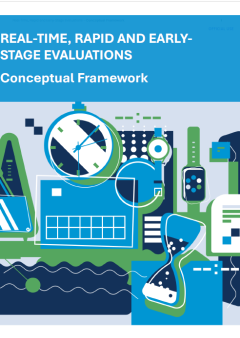
Conceptual Framework for Real-Time, Rapid and Early-Stage Evaluations
Real-time, rapid and early-stage evaluations (RTRES) have gained prominence in many MDBs in response to recent global crises. These evaluations are valued for their relevance and timely contribution to strategic decision-making while interventions are still ongoing or being designed. Most have focused on crisis-related interventions, such as the 2008–2009 Global Financial Crisis, the COVID-19 pandemic in 2020, and the war in Ukraine since 2022. Others have assessed institutional strategies, access to climate finance, safeguard implementation, new lending instruments, and operational reforms.
As the use of RTRES evaluations becomes more widespread across MDBs, the need for greater harmonization of definitions and approaches is increasingly evident. Aligning terminology facilitates comparability, fosters shared learning, and strengthens the credibility of RTRES evaluations across institutions. In this context, the Evaluation Cooperation Group (ECG) plays a key role in advancing common standards and promoting coherence in how RTRES evaluations are conceptualized and implemented. This Framework builds on this shared understanding, offering definitions, typologies, and considerations to guide RTRES evaluations.
